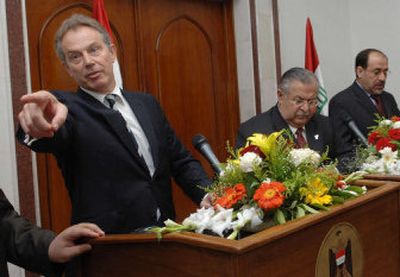Missing soldiers’ fate remains uncertain

BAGHDAD – Two of the three U.S. soldiers missing since a May 12 ambush south of Baghdad are believed to have been alive as recently as Friday morning, but the third might be dead, the military said Saturday.
The fate of the men has been the focus of a huge dragnet by U.S. troops, who have detained more than 700 people for questioning in and around Yusifiya, a market town 10 miles south of the capital.
Information obtained from the detainees and other sources has provided a clearer picture of the ambush, but the military still does not know the men’s fates definitively, the top U.S. commander in Iraq said in an interview with Army Times published Saturday and confirmed by a spokesman, Col. Steven A. Boylan.
Gen. David H. Petraeus told the newspaper that the military had identified the person chiefly responsible for the abduction of the three men and the killing of four other soldiers and a translator.
“We know who that guy is,” the commander said. “He’s sort of an affiliate of al-Qaida. He’s the big player down in that area. We’ve tangled with him before.”
The missing are Pfc. Joseph J. Anzack Jr., 20, of Torrance, Calif.; Spc. Alex R. Jimenez, 25, of Lawrence, Mass.; and Pvt. Byron W. Fouty, 19, of Waterford, Mich. It is not known who among them might be dead or alive, Boylan said.
As the hunt for the men continued Saturday, the military announced the deaths of five other soldiers, the corpses of 55 Iraqis were found across the country, and British Prime Minister Tony Blair made an unannounced visit that was marred by violence.
A mortar shell landed in the capital’s Green Zone as Blair, who leaves office next month crippled by the unpopularity of the war, paid a visit Saturday. The attack slightly injured an Iraqi.
Meeting reporters, Blair said good news in the country was being obscured by disproportionate attention paid to the car bombs, mortar fire and attacks.
Blair repeated that he saw “real signs of change and progress” in Iraq but declined to be specific, deferring to Iraqi Prime Minister Nouri al-Maliki when challenged by reporters. The Iraqi leader cited Anbar province, where Sunni sheiks have lent their support to the U.S.-Iraqi security plan for the region, and Kurdistan in the north, where he said the number of car bombs has dropped “from 10 to 14 before, and to two to three a day now.”
Behind closed doors, al-Maliki told Blair that he was concerned about support being offered to militants from sources in Saudi Arabia and other Persian Gulf states, according to a source privy to the talks.
Al-Maliki also brought up concerns that other political powers might be working toward a coup in Iraq, but Blair reassured him that neither Britain nor the United States would support such a move, the source said.
Britain has almost completed the process of pulling about 1,600 troops out of Iraq, leaving a force of 5,500 based mainly on the fringes of the southern city of Basra, which Blair also visited Saturday.
Blair vowed that British involvement in Iraq would continue after his departure.